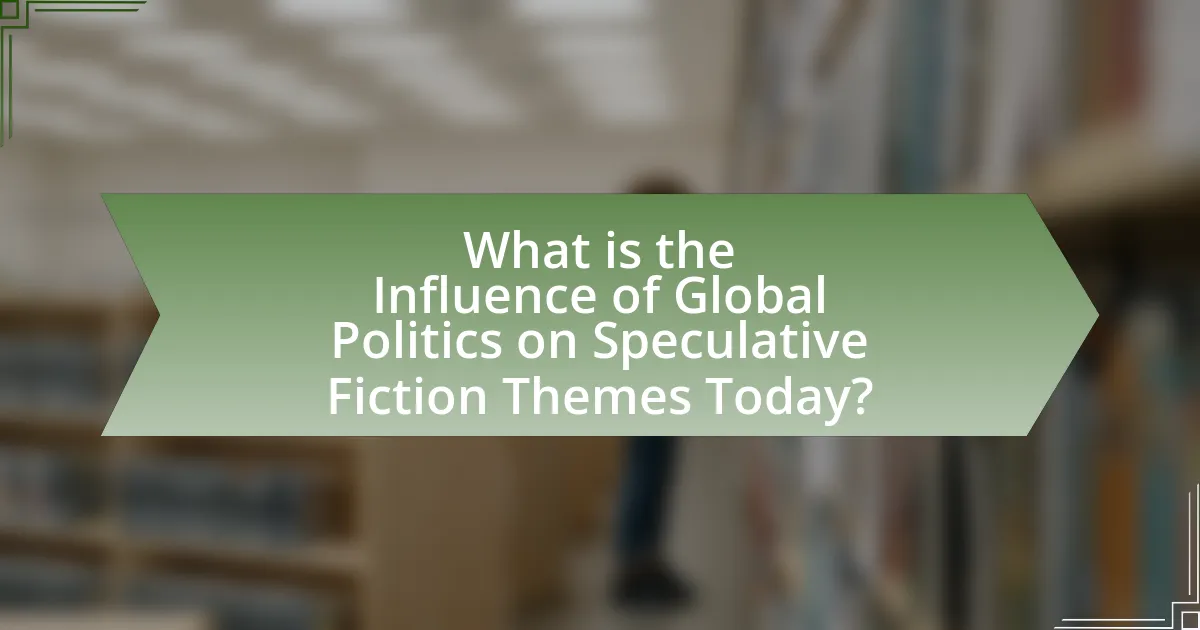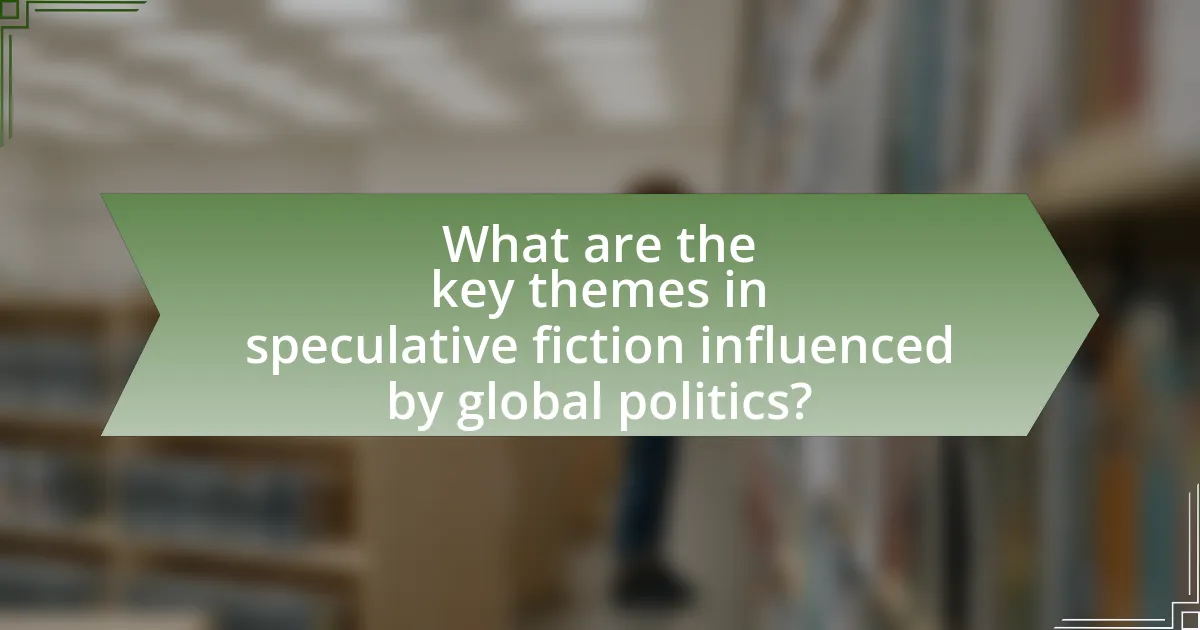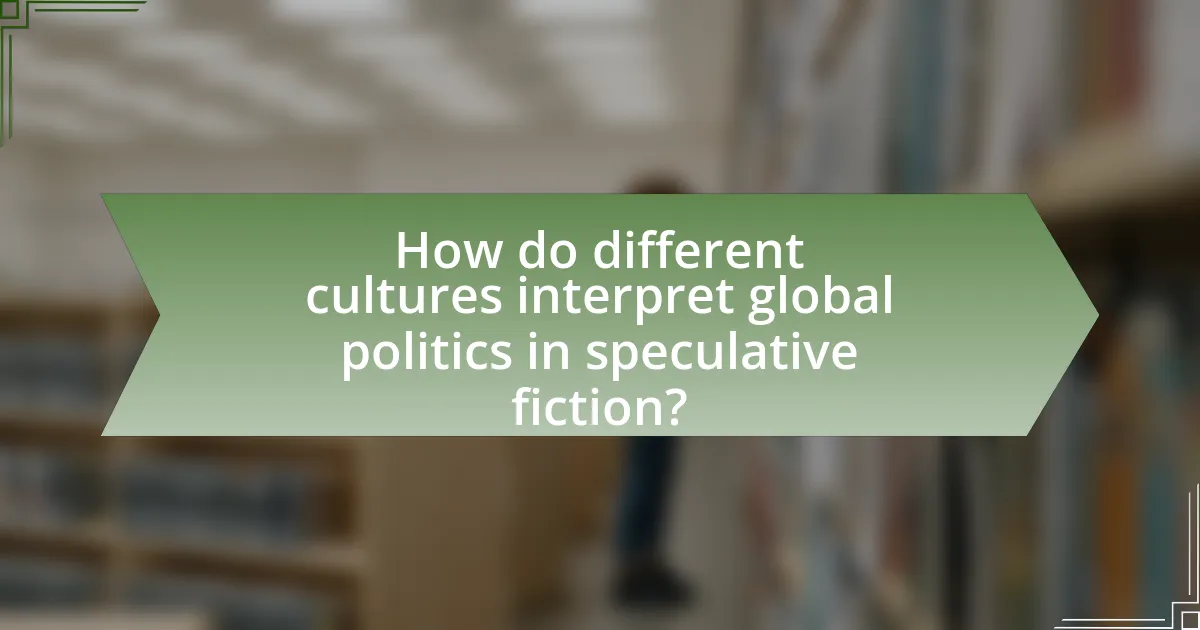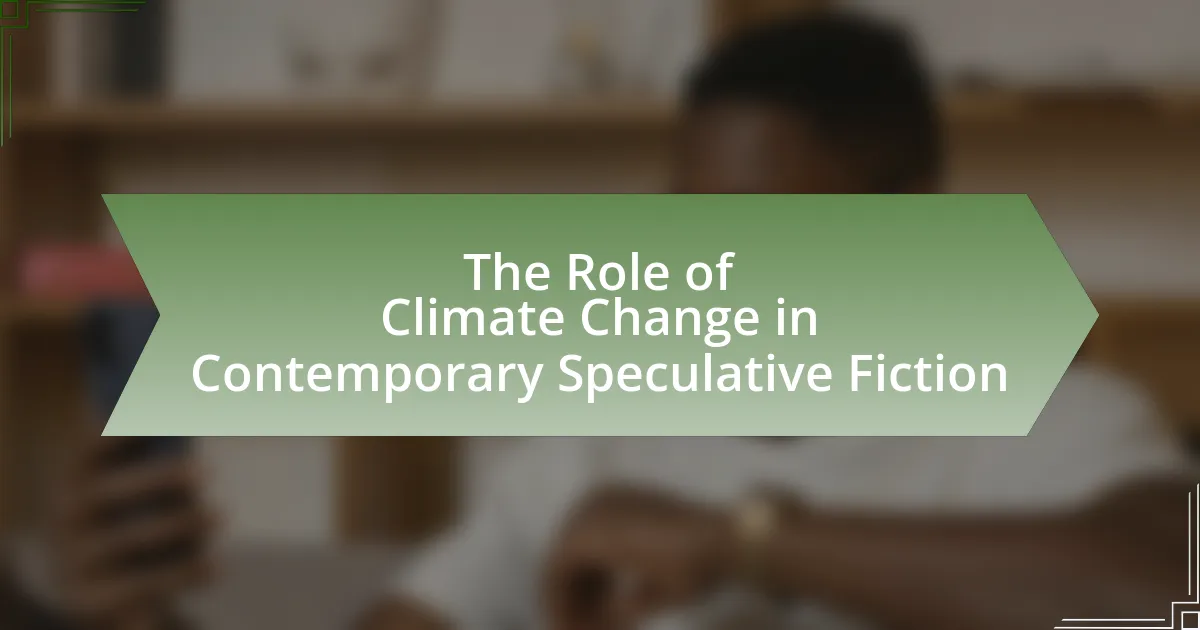The article examines the significant influence of global politics on contemporary speculative fiction themes, highlighting how narratives are shaped by issues such as climate change, authoritarianism, and technological surveillance. It discusses the impact of specific political events, including the rise of authoritarian regimes and the COVID-19 pandemic, on the thematic landscape of speculative fiction. The article also explores how authors reflect political climates in their works, the intersection of social movements with narrative themes, and the variations in cultural interpretations of political issues within the genre. Additionally, it emphasizes the importance of analyzing these connections to foster critical thinking about societal anxieties and aspirations reflected in speculative fiction.

What is the Influence of Global Politics on Speculative Fiction Themes Today?
Global politics significantly influences speculative fiction themes today by shaping narratives around issues such as climate change, authoritarianism, and technological surveillance. For instance, the rise of authoritarian regimes has led to dystopian themes in works like “The Handmaid’s Tale” by Margaret Atwood, which reflects concerns about women’s rights and government control. Additionally, the ongoing climate crisis is a central theme in works like “The Ministry for the Future” by Kim Stanley Robinson, illustrating the urgent need for global cooperation to address environmental challenges. These examples demonstrate how contemporary political issues are woven into speculative fiction, making it a reflection of current societal anxieties and aspirations.
How do global political events shape speculative fiction narratives?
Global political events significantly shape speculative fiction narratives by influencing themes, character motivations, and societal structures within the stories. For instance, the Cold War era inspired numerous dystopian narratives that explored themes of surveillance, totalitarianism, and the consequences of nuclear warfare, as seen in works like George Orwell’s “1984” and Philip K. Dick’s “The Man in the High Castle.” Additionally, contemporary issues such as climate change and global pandemics have led to the emergence of eco-fiction and apocalyptic narratives, reflecting societal anxieties and potential futures, as demonstrated in novels like “The Overstory” by Richard Powers and “Station Eleven” by Emily St. John Mandel. These examples illustrate how speculative fiction serves as a lens through which to examine and critique the implications of current political climates, making the genre a powerful tool for social commentary and reflection.
What specific political events have influenced recent speculative fiction?
Recent speculative fiction has been significantly influenced by political events such as the rise of authoritarianism, climate change policies, and the COVID-19 pandemic. The resurgence of authoritarian regimes in various countries has prompted authors to explore themes of surveillance, oppression, and resistance, as seen in works like “The Power” by Naomi Alderman. Climate change, particularly the Paris Agreement and its implications, has led to narratives focusing on environmental collapse and societal adaptation, exemplified in “The Ministry for the Future” by Kim Stanley Robinson. Additionally, the global response to the COVID-19 pandemic has inspired speculative fiction that examines public health crises, societal breakdown, and the impact of misinformation, as illustrated in “Severance” by Ling Ma. These events have shaped the thematic landscape of contemporary speculative fiction, reflecting societal anxieties and aspirations.
How do authors reflect political climates in their works?
Authors reflect political climates in their works by incorporating contemporary social issues, government policies, and ideological conflicts into their narratives. For instance, George Orwell’s “1984” critiques totalitarianism and surveillance, mirroring the political anxieties of the 20th century, particularly during the rise of authoritarian regimes. Similarly, Margaret Atwood’s “The Handmaid’s Tale” addresses themes of gender oppression and religious extremism, reflecting concerns about women’s rights and political control in the late 20th century. These examples demonstrate how literature serves as a lens through which readers can understand and critique the political landscapes of their times.
Why is it important to analyze the intersection of global politics and speculative fiction?
Analyzing the intersection of global politics and speculative fiction is important because it reveals how political contexts shape narrative themes and societal perceptions. Speculative fiction often reflects contemporary political anxieties, allowing readers to explore potential futures influenced by current global issues such as climate change, authoritarianism, and technological advancements. For instance, works like Margaret Atwood’s “The Handmaid’s Tale” critique totalitarian regimes and gender oppression, mirroring real-world political climates. This analysis fosters critical thinking about the implications of political decisions and encourages dialogue on possible futures, making it a vital area of study in understanding both literature and global affairs.
What insights can speculative fiction provide about current political issues?
Speculative fiction offers critical insights into current political issues by exploring alternative realities and potential futures that reflect societal anxieties and challenges. For instance, works like George Orwell’s “1984” and Margaret Atwood’s “The Handmaid’s Tale” illustrate the dangers of totalitarianism and the erosion of personal freedoms, resonating with contemporary concerns about surveillance and authoritarian governance. These narratives serve as cautionary tales, prompting readers to reflect on the implications of current political trends, such as the rise of populism and the impact of technology on privacy. By envisioning extreme scenarios, speculative fiction encourages discourse on the ethical and moral dimensions of political decisions, thereby fostering a deeper understanding of the complexities surrounding governance and societal values.
How does speculative fiction serve as a commentary on political ideologies?
Speculative fiction serves as a commentary on political ideologies by creating alternative realities that reflect and critique contemporary political systems. Through narratives that explore dystopian societies, authoritarian regimes, or utopian visions, authors can highlight the consequences of specific ideologies, such as capitalism, socialism, or totalitarianism. For instance, George Orwell’s “1984” critiques totalitarianism by depicting a society under constant surveillance, illustrating the dangers of oppressive governance. Similarly, Margaret Atwood’s “The Handmaid’s Tale” examines the implications of patriarchal control and religious extremism, prompting readers to reflect on gender politics and individual rights. These works not only entertain but also provoke critical thought about the political structures that shape our world, making speculative fiction a powerful tool for social commentary.

What are the key themes in speculative fiction influenced by global politics?
Key themes in speculative fiction influenced by global politics include dystopian futures, authoritarianism, climate change, and the impact of technology on society. Dystopian futures often reflect societal fears regarding government control and loss of individual freedoms, as seen in works like George Orwell’s “1984,” which critiques totalitarian regimes. Authoritarianism is frequently explored through narratives that depict oppressive governments, highlighting the consequences of political power imbalances. Climate change serves as a backdrop in many speculative works, illustrating the potential environmental catastrophes resulting from political inaction, as exemplified in Kim Stanley Robinson’s “New York 2140.” Additionally, the role of technology in shaping human experiences and governance is a recurring theme, with stories like “The Circle” by Dave Eggers examining surveillance and privacy issues in a digital age. These themes collectively reflect the complexities and challenges posed by contemporary global politics.
How do themes of dystopia and utopia relate to political contexts?
Themes of dystopia and utopia are intrinsically linked to political contexts as they reflect societal aspirations and fears regarding governance and power structures. Dystopian narratives often emerge in response to authoritarian regimes, illustrating the consequences of oppressive political systems, as seen in George Orwell’s “1984,” which critiques totalitarianism. Conversely, utopian themes represent idealized societies that embody democratic values and social equity, often serving as a critique of existing political conditions, such as in Thomas More’s “Utopia,” which envisions a society based on communal ownership and justice. These literary themes provide a lens through which to examine real-world political dynamics, highlighting the impact of governance on individual freedoms and societal well-being.
What role does government control play in dystopian narratives?
Government control serves as a central mechanism in dystopian narratives, often depicting oppressive regimes that manipulate society through surveillance, censorship, and authoritarian rule. These narratives illustrate how government control can strip individuals of their freedoms, creating a climate of fear and conformity. For instance, George Orwell’s “1984” exemplifies this by showcasing a totalitarian state that employs constant surveillance and propaganda to maintain power, reflecting real-world concerns about government overreach and loss of civil liberties. Such portrayals resonate with audiences, highlighting the potential consequences of unchecked political authority in contemporary society.
How do utopian visions reflect political aspirations or critiques?
Utopian visions reflect political aspirations or critiques by presenting idealized societies that embody specific values and governance structures, often in response to contemporary social issues. These visions serve as a critique of existing political systems by highlighting their shortcomings and proposing alternatives that prioritize equality, justice, and sustainability. For instance, Thomas More’s “Utopia” critiques the social inequalities of 16th-century England by envisioning a society where property is communal and social welfare is prioritized. Similarly, contemporary speculative fiction often explores themes of environmentalism and social justice, reflecting current political movements and aspirations for a more equitable future. This connection between utopian narratives and political discourse illustrates how literature can influence and inspire real-world change.
What impact do social movements have on speculative fiction themes?
Social movements significantly influence speculative fiction themes by reflecting societal concerns and aspirations. For instance, the civil rights movement in the 1960s inspired works like Octavia Butler’s “Kindred,” which explores race and power dynamics through time travel. Similarly, contemporary movements such as Black Lives Matter and climate activism shape narratives that address systemic injustice and environmental crises, as seen in works like N.K. Jemisin’s “The Broken Earth” trilogy, which critiques oppression and ecological collapse. These examples demonstrate how speculative fiction serves as a lens through which social movements can be examined, allowing authors to engage with and critique current issues while envisioning alternative futures.
How are issues of race, gender, and class represented in speculative fiction?
Issues of race, gender, and class are represented in speculative fiction through diverse narratives that challenge societal norms and reflect contemporary social dynamics. Speculative fiction often uses alternate realities or futuristic settings to explore the implications of systemic inequalities, allowing authors to critique existing power structures. For example, works like Octavia Butler’s “Kindred” and N.K. Jemisin’s “The Fifth Season” explicitly address racial and gender disparities, illustrating how these issues manifest in both historical and speculative contexts. Additionally, the genre frequently incorporates class struggles, as seen in works like “The Hunger Games” by Suzanne Collins, which highlights the stark divide between socioeconomic classes. These representations serve to provoke thought and discussion about real-world issues, making speculative fiction a powerful medium for social commentary.
What examples illustrate the influence of social movements on recent works?
Recent works in speculative fiction have been significantly influenced by social movements such as Black Lives Matter and the Me Too movement. For instance, the novel “The Water Dancer” by Ta-Nehisi Coates incorporates themes of racial injustice and historical trauma, reflecting the ongoing discourse around systemic racism. Similarly, the anthology “New Suns: Original Speculative Fiction by People of Color,” edited by Nisi Shawl, showcases diverse voices and perspectives, directly responding to calls for greater representation in literature. These examples demonstrate how contemporary social movements shape narrative themes and character development in speculative fiction, making them more relevant to current societal issues.

How do different cultures interpret global politics in speculative fiction?
Different cultures interpret global politics in speculative fiction through unique narratives that reflect their historical experiences, social values, and political contexts. For instance, Western speculative fiction often emphasizes individualism and dystopian themes, as seen in works like George Orwell’s “1984,” which critiques totalitarianism. In contrast, Japanese speculative fiction, such as the anime “Ghost in the Shell,” explores themes of technology and identity, influenced by Japan’s post-war economic transformation and societal changes. Additionally, African speculative fiction frequently addresses colonial legacies and social justice, as illustrated in Nnedi Okorafor’s “Binti,” which incorporates traditional African culture into futuristic settings. These interpretations reveal how cultural backgrounds shape the portrayal of global political issues, making speculative fiction a lens through which diverse perspectives on power, governance, and societal challenges are examined.
What are the variations in speculative fiction themes across cultures?
Variations in speculative fiction themes across cultures reflect distinct societal values, historical contexts, and political climates. For instance, Western speculative fiction often emphasizes individualism and technological advancement, as seen in works like Isaac Asimov’s “Foundation” series, which explores the impact of technology on society. In contrast, Japanese speculative fiction frequently incorporates elements of nature and spirituality, as illustrated by Hayao Miyazaki’s films, which highlight the relationship between humanity and the environment. Additionally, African speculative fiction often addresses post-colonial themes and community resilience, as demonstrated in Nnedi Okorafor’s “Binti,” which explores identity and cultural heritage. These thematic variations are shaped by each culture’s unique experiences and challenges, illustrating how global politics and social issues influence speculative narratives.
How do cultural backgrounds shape the portrayal of political themes?
Cultural backgrounds significantly shape the portrayal of political themes by influencing the narratives, symbols, and values depicted in various forms of media. For instance, in speculative fiction, cultural contexts determine how political issues such as power dynamics, governance, and social justice are represented. In works like “The Dispossessed” by Ursula K. Le Guin, the contrasting societies reflect anarchist and capitalist ideologies, showcasing how cultural perspectives inform political discourse. Additionally, the representation of political themes often varies across cultures; for example, dystopian narratives in Western literature may emphasize individualism and freedom, while those in Eastern contexts might focus on collectivism and community. This divergence illustrates that cultural backgrounds not only inform the themes explored but also shape the audience’s interpretation and engagement with political issues.
What examples highlight cultural differences in speculative fiction narratives?
Cultural differences in speculative fiction narratives are highlighted by works such as “The Three-Body Problem” by Liu Cixin, which reflects Chinese philosophical concepts and societal issues, contrasting with Western narratives like “Dune” by Frank Herbert, which explores themes of imperialism and ecological sustainability. Liu’s novel incorporates elements of Chinese history and collective societal challenges, while Herbert’s work emphasizes individualism and the consequences of resource exploitation. These examples illustrate how cultural contexts shape the themes and narratives in speculative fiction, revealing differing worldviews and societal concerns influenced by global politics.
How does globalization affect the themes in speculative fiction?
Globalization significantly influences the themes in speculative fiction by introducing complex narratives that explore cultural exchange, technological advancement, and socio-political dynamics. As societies become more interconnected, speculative fiction often reflects the resulting tensions and synergies, such as the clash of ideologies and the blending of cultures. For instance, works like “The Windup Girl” by Paolo Bacigalupi illustrate the consequences of global capitalism and environmental degradation, showcasing how globalization can lead to both innovation and exploitation. This thematic exploration is supported by the increasing prevalence of global issues, such as climate change and migration, which are frequently depicted in contemporary speculative narratives, highlighting the genre’s role in critiquing and imagining responses to a rapidly changing world.
What role does technology play in the globalization of speculative fiction?
Technology serves as a crucial facilitator in the globalization of speculative fiction by enabling widespread access to diverse narratives and fostering cross-cultural exchanges. The rise of the internet and digital platforms allows authors from various backgrounds to share their work globally, breaking geographical barriers. For instance, platforms like Wattpad and Amazon Kindle Direct Publishing have democratized publishing, allowing voices from underrepresented regions to reach international audiences. Additionally, advancements in translation technology, such as machine translation, enhance the accessibility of speculative fiction across different languages, further promoting global readership. This interconnectedness not only enriches the genre with varied perspectives but also reflects the complexities of global politics, as themes in speculative fiction often address issues like migration, climate change, and technological surveillance, resonating with a worldwide audience.
How do global interconnectedness and cultural exchange influence storytelling?
Global interconnectedness and cultural exchange significantly influence storytelling by facilitating the blending of diverse narratives and perspectives. This interaction allows storytellers to incorporate various cultural elements, themes, and motifs, enriching the narrative landscape. For instance, the rise of digital media and global communication has enabled authors from different backgrounds to share their stories with a wider audience, leading to a cross-pollination of ideas. A concrete example is the popularity of Japanese anime and manga in Western cultures, which has inspired local creators to adopt and adapt these styles and themes, resulting in hybrid storytelling forms. This cultural exchange not only broadens the scope of storytelling but also fosters greater empathy and understanding among audiences, as they encounter narratives that reflect different cultural experiences and worldviews.
What practical insights can writers gain from understanding the influence of global politics on speculative fiction?
Writers can gain practical insights into how global politics shapes societal fears, aspirations, and narratives in speculative fiction. Understanding the political landscape allows writers to create more relevant and resonant stories that reflect contemporary issues, such as climate change, authoritarianism, and technological surveillance. For instance, the rise of dystopian narratives in response to political unrest, as seen in works like “The Handmaid’s Tale” by Margaret Atwood, illustrates how writers can draw from real-world events to enhance their storytelling. This connection between global politics and speculative fiction not only enriches character development and plot but also engages readers by addressing pressing global concerns, making the fiction more impactful and thought-provoking.
How can authors effectively incorporate political themes into their narratives?
Authors can effectively incorporate political themes into their narratives by embedding real-world political issues within character arcs and plot developments. This approach allows for a nuanced exploration of themes such as power dynamics, social justice, and governance. For instance, George Orwell’s “1984” illustrates totalitarianism and surveillance, reflecting concerns about government overreach during the 20th century. By using allegory and metaphor, authors can engage readers with complex political realities while maintaining narrative coherence. Additionally, integrating diverse perspectives and voices can enhance the authenticity of political themes, as seen in works like “The Handmaid’s Tale” by Margaret Atwood, which critiques patriarchal structures and reproductive rights. This method not only enriches the narrative but also prompts readers to reflect on contemporary political landscapes.
What strategies can writers use to engage with contemporary political issues through speculative fiction?
Writers can engage with contemporary political issues through speculative fiction by employing strategies such as creating alternative realities, using allegory, and incorporating social commentary. By crafting alternative realities, writers can explore the implications of current political trends in a controlled environment, allowing readers to reflect on real-world issues without direct confrontation. For instance, George Orwell’s “1984” serves as a powerful critique of totalitarianism, illustrating the dangers of surveillance and loss of freedom.
Using allegory enables writers to represent complex political ideas through symbolic characters and events, making the themes more accessible. An example is Margaret Atwood’s “The Handmaid’s Tale,” which critiques patriarchy and authoritarianism by depicting a dystopian society that mirrors contemporary gender politics.
Incorporating social commentary allows writers to directly address political issues within the narrative, prompting readers to consider their implications. Works like Octavia Butler’s “Parable of the Sower” address climate change and social inequality, reflecting urgent contemporary concerns. These strategies not only engage readers but also encourage critical thinking about the political landscape.




